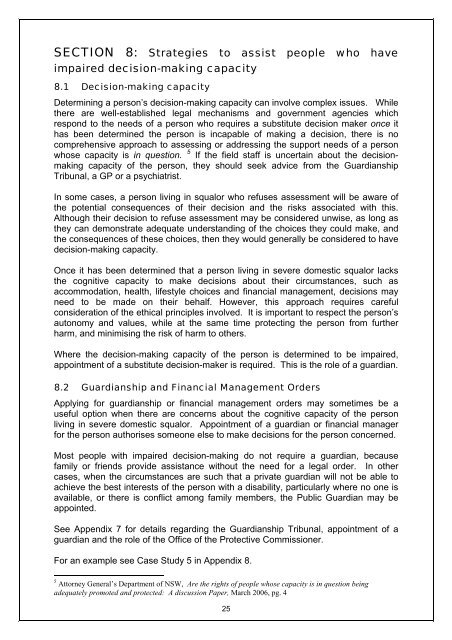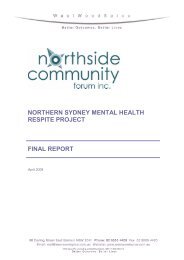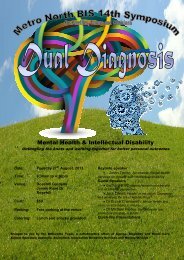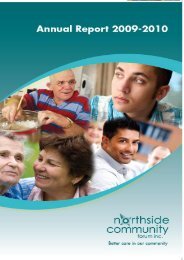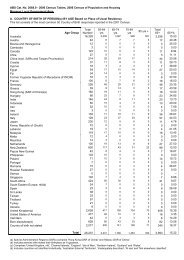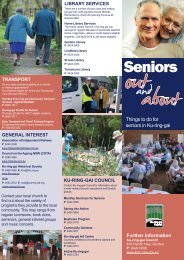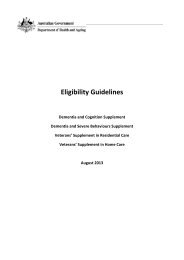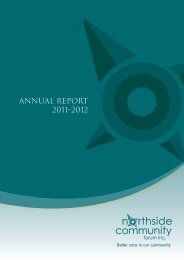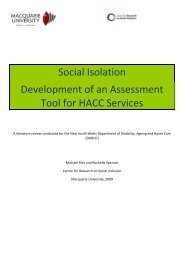Guidelines for field staff to assist people living in ... - Housing NSW
Guidelines for field staff to assist people living in ... - Housing NSW
Guidelines for field staff to assist people living in ... - Housing NSW
You also want an ePaper? Increase the reach of your titles
YUMPU automatically turns print PDFs into web optimized ePapers that Google loves.
SECTION 8: Strategies <strong>to</strong> <strong>assist</strong> <strong>people</strong> who haveimpaired decision-mak<strong>in</strong>g capacity8.1 Decision-mak<strong>in</strong>g capacityDeterm<strong>in</strong><strong>in</strong>g a person’s decision-mak<strong>in</strong>g capacity can <strong>in</strong>volve complex issues. Whilethere are well-established legal mechanisms and government agencies whichrespond <strong>to</strong> the needs of a person who requires a substitute decision maker once ithas been determ<strong>in</strong>ed the person is <strong>in</strong>capable of mak<strong>in</strong>g a decision, there is nocomprehensive approach <strong>to</strong> assess<strong>in</strong>g or address<strong>in</strong>g the support needs of a personwhose capacity is <strong>in</strong> question. 5 If the <strong>field</strong> <strong>staff</strong> is uncerta<strong>in</strong> about the decisionmak<strong>in</strong>gcapacity of the person, they should seek advice from the GuardianshipTribunal, a GP or a psychiatrist.In some cases, a person <strong>liv<strong>in</strong>g</strong> <strong>in</strong> squalor who refuses assessment will be aware ofthe potential consequences of their decision and the risks associated with this.Although their decision <strong>to</strong> refuse assessment may be considered unwise, as long asthey can demonstrate adequate understand<strong>in</strong>g of the choices they could make, andthe consequences of these choices, then they would generally be considered <strong>to</strong> havedecision-mak<strong>in</strong>g capacity.Once it has been determ<strong>in</strong>ed that a person <strong>liv<strong>in</strong>g</strong> <strong>in</strong> severe domestic squalor lacksthe cognitive capacity <strong>to</strong> make decisions about their circumstances, such asaccommodation, health, lifestyle choices and f<strong>in</strong>ancial management, decisions mayneed <strong>to</strong> be made on their behalf. However, this approach requires carefulconsideration of the ethical pr<strong>in</strong>ciples <strong>in</strong>volved. It is important <strong>to</strong> respect the person’sau<strong>to</strong>nomy and values, while at the same time protect<strong>in</strong>g the person from furtherharm, and m<strong>in</strong>imis<strong>in</strong>g the risk of harm <strong>to</strong> others.Where the decision-mak<strong>in</strong>g capacity of the person is determ<strong>in</strong>ed <strong>to</strong> be impaired,appo<strong>in</strong>tment of a substitute decision-maker is required. This is the role of a guardian.8.2 Guardianship and F<strong>in</strong>ancial Management OrdersApply<strong>in</strong>g <strong>for</strong> guardianship or f<strong>in</strong>ancial management orders may sometimes be auseful option when there are concerns about the cognitive capacity of the person<strong>liv<strong>in</strong>g</strong> <strong>in</strong> severe domestic squalor. Appo<strong>in</strong>tment of a guardian or f<strong>in</strong>ancial manager<strong>for</strong> the person authorises someone else <strong>to</strong> make decisions <strong>for</strong> the person concerned.Most <strong>people</strong> with impaired decision-mak<strong>in</strong>g do not require a guardian, becausefamily or friends provide <strong>assist</strong>ance without the need <strong>for</strong> a legal order. In othercases, when the circumstances are such that a private guardian will not be able <strong>to</strong>achieve the best <strong>in</strong>terests of the person with a disability, particularly where no one isavailable, or there is conflict among family members, the Public Guardian may beappo<strong>in</strong>ted.See Appendix 7 <strong>for</strong> details regard<strong>in</strong>g the Guardianship Tribunal, appo<strong>in</strong>tment of aguardian and the role of the Office of the Protective Commissioner.For an example see Case Study 5 <strong>in</strong> Appendix 8.5 At<strong>to</strong>rney General’s Department of <strong>NSW</strong>, Are the rights of <strong>people</strong> whose capacity is <strong>in</strong> question be<strong>in</strong>gadequately promoted and protected: A discussion Paper, March 2006, pg. 425


